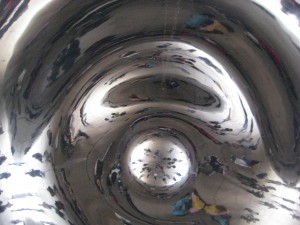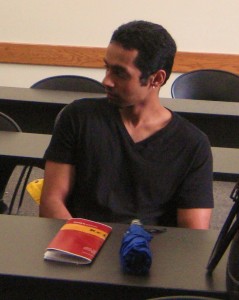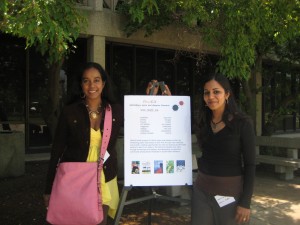Who defines America?
 It’s been a couple of weeks since I got back from Chicago, but the conversation which I wanted to write about then is still on my mind and will be for a while. There was a bottle of wine and a group of writers discussing the matter of America, what could be better or less controversial? So I was a little bemused when one of our group uttered that infamous holler of ignorance, love it or leave it. Who, the writer demanded to know, has the right to come here and expect that “we” (Americans, albeit foreign born or recent descendants of the foreign born), know all about them? Be sensitive to them? What gives them the right to tell “us” what “our” country should look like, be and do? They should be grateful, the writer continued – it was a little difficult to thunder given the volume of other Friday evening conversations at an open air venue – and not come here and just “expect things.”
It’s been a couple of weeks since I got back from Chicago, but the conversation which I wanted to write about then is still on my mind and will be for a while. There was a bottle of wine and a group of writers discussing the matter of America, what could be better or less controversial? So I was a little bemused when one of our group uttered that infamous holler of ignorance, love it or leave it. Who, the writer demanded to know, has the right to come here and expect that “we” (Americans, albeit foreign born or recent descendants of the foreign born), know all about them? Be sensitive to them? What gives them the right to tell “us” what “our” country should look like, be and do? They should be grateful, the writer continued – it was a little difficult to thunder given the volume of other Friday evening conversations at an open air venue – and not come here and just “expect things.”
Which made me muse aloud – okay, I admit, it was a sharper than musing – about the right people feel to dictate who among us gets to define America. Earlier in the day I had listened to Deepak Unnikrishnan (there’s a bio here and a review of his book, Coffee Stains in a Camel’s Teacuphere) speak persuasively  about the obligation he feels to his classified-as-Indian parents, to write and speak of their work and the work of multitudes of non-nationals to build and sustain Abu Dhabi. Two years ago, NYU created NYU Abu Dhabi amidst a clamor of support and dissent, the latter for all the wrong reasons. There was nothing new about yet another part of Abu Dhabi society (in this case education) being fortified by foreigners, that was, after all, the way the society is set up. What is wrong is what has always been wrong: the way in which Abu Dhabians perceive, and therefore devalue, those foreign nationals no matter their status. Whether one lectures on Aristotle or swills the toilets, a foreigner is simply a hired hand with no say in the ephemeral yet intensely meaningful civic life of the city they call home.
about the obligation he feels to his classified-as-Indian parents, to write and speak of their work and the work of multitudes of non-nationals to build and sustain Abu Dhabi. Two years ago, NYU created NYU Abu Dhabi amidst a clamor of support and dissent, the latter for all the wrong reasons. There was nothing new about yet another part of Abu Dhabi society (in this case education) being fortified by foreigners, that was, after all, the way the society is set up. What is wrong is what has always been wrong: the way in which Abu Dhabians perceive, and therefore devalue, those foreign nationals no matter their status. Whether one lectures on Aristotle or swills the toilets, a foreigner is simply a hired hand with no say in the ephemeral yet intensely meaningful civic life of the city they call home.
Thirty five years into their tenure, Deepak’s parents are not considered natives, nor will their life’s work give them the right to stay should they lose their jobs. Appalling, isn’t it? And yet, how different is an America where its citizens express those same biases? Is it no more than an Abu Dhabi, then, on a grander scale, with greater freedom? Or isn’t it the case that every immigrant here, no matter their legal status or newness, their degrees or lack thereof, their 401(k) plans or their intimacy with the soil in which they grow the strawberries for our tables while they are sprayed with pesticides from above, whose labor and starry eyes and acquisitions and tastes create the texture of this country, has an equal right to define it?
Recently I came across this clip of the spoken-word artist, YaliniDream, who performed at my friend, Charles Rice Gonzalez’ space, the Bronx Academy for Art & Dance (BAAD). This is Marian Yalini Thambynayagam, who is a second-generation Sri Lankan American. “I am not entertained by your confusion” she says in this particular piece, responding to the people who, like my young friend mentioned at the beginning of this post, don’t know where she is from, don’t care and don’t think they should.
Momma’s Hip Hop Kitchen Vol. II: YaliniDream from Jennifer Hobdy on Vimeo.
Listening to her was certainly difficult for me, a natural-born Sri Lankan with a strong sense of my country of birth, and a different perspective and sensitivity to the work she is performing. While there is deep yearning articulated by her speaking of the one tear that a Sri Lankan immigrant tries to catch in his or her hand just so she or he can taste the salt-soaked oceans of their past, knowing the terrifying complexities that abound for those still on that small island and being familiar with the self-indulgent fantasies of those of us within the diaspora, place a barrier between us that I find it difficult to cross. But there is great rage and anguish in her performance and she is a very gifted. Moreover, the entire piece articulates what might actually run through the mind of your average immigrant/from-somewhere-else/multiply-affiliated/tourist in response to a poorly placed question.  And aren’t those hidden thunderbolts precisely what drive us newcomers to say this is my country too? I will write my story, sing my song, speak my language, vote my politics, articulate my rage until I am no longer foreign to you?
And aren’t those hidden thunderbolts precisely what drive us newcomers to say this is my country too? I will write my story, sing my song, speak my language, vote my politics, articulate my rage until I am no longer foreign to you?
I pick up books for no good reason; reason follows inevitably from the reading. And so, while re-reading the book, Half & Half: Writers on Growing up Biracial+Bicultural, I came across the following observation by Bharati Mukherjee:
In cities like San Francisco, where immigrants from Central America and South America jostle elbows with refugees from Cambodia and Vietnam, I’ve eavesdropped on thickly accented, enthusiastically conducted conversation “drive-through diagnostics” and “bun management” between people wearing fast-food-company logos on their shirt pockets. I want to think that in our multicultural United States, immigrants like them will play the stabilizing role that pride and history deny the major players.
The point is not to adopt the mainstream American’s easy ironies nor the expatriate’s self-protective contempt for the “vulgarity” of immigration. The point is to stay resilient and compassionate in the face of change.
Ah, at last, a happy balance where there is neither disgust at the people who “don’t understand” nor anger at those who long to be understood. Perhaps among the new, younger, truly multinational, Americans – like the President himself – there will be a recognition that patriotism is as patriotism does, and the same goes for citizenship. The country, any country, belongs to those who live in it, work within its borders, and help keep its many wheels turning.


Well put. I teach ESL. The stories I hear from clients makes my hair stand on end. Who do we think we are? Where would this country be without the infusion of the very people your last sentence refers to whether or not they have been here for 400 years or 4 days.
As an addendum to the original post – and Sasialiters, do write your comments here so the conversation can be as engaging here as it is in my personal email! – I want to share this link to guernica magazine’s pick, RELIGION OR ETHNICITY which is a collection of essays by Zvi Gitelman, which deals with the matter of Jewish identity. Here it is: http://www.guernicamag.com/blog/1124/staff_pick_jordan_hirsch_1/
I am familiar with the anger a “resident” feels when one’s nation is attacked by inhabitants who are clearly not its citizens. It is a fair reaction. But I am also of the opinion an individual needn’t adore a place or be comfortable in it in order to cling to it or have the audacity to call it home. Sometimes, leaving immediately isn’t an option, especially if you are desperate, even if you are on a visa. And sometimes, home is where you are; isn’t complaining what one does at home?
I have had a passport since I was born. My passport identifies my nationality but it gets it wrong, ignoring details. It does not pinpoint where I was raised, how I was raised, what I know, who I cannot be. I am not a citizen of the Emirates but it used to be my home. The papered statelessness or rootlessness or transplantation that has come out of this puts my identity in flux. Nevertheless, I think it is important to acknowledge some people leave not because they are unhappy, but because they cannot stay. Still, until you leave, even after you leave, home is home. Even if the paperwork suggests otherwise.
very enlightening, especially the story of Deepak Unnikrishnan’s parents precarious plight in Abu Dhabi. The best of this society is its ability to continually reinvent and redefine itself, sometimes in quantum fashion. And that process entails the numerous racial, ethnic, religious and cultural components continually engaging in the sculpting of America.
Beautifully expressed, my dear.